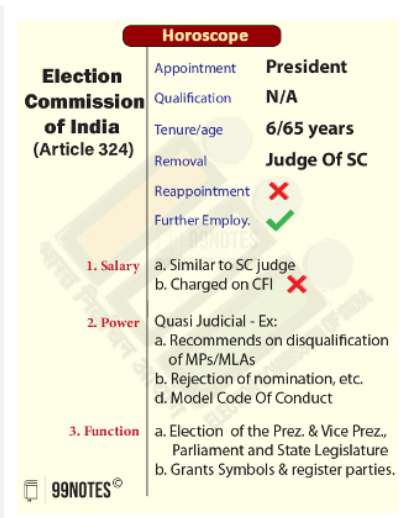Gyanesh Kumar Appointed as Chief Election Commissioner: Process, Controversy, and Legal Implications
(Source – Indian Express, Section – Explained – Page No. – 18)
|
Topic: GS2 – Polity |
|
Context |
|
Analysis of the news:

Background of Appointment Process
-
The Election Commission of India (ECI) is a three-member body consisting of one Chief Election Commissioner (CEC) and two Election Commissioners (ECs).
-
Traditionally, the CEC was appointed by the President based on the Prime Minister’s advice, with seniority playing a key role.
-
However, the new Chief Election Commissioner And Other Election Commissioners (Appointment, Conditions of Service And Term of Office) Act, 2023, has altered this process.
The New Appointment Process:
Under the 2023 Act, a two-step process was introduced:
-
Search Committee: Headed by the Law Minister, this committee shortlists five candidates.
-
Selection Committee: Comprising the Prime Minister, Leader of Opposition, and a Cabinet Minister nominated by the PM, this committee makes the final appointment. Notably, Section 8 allows the committee to consider candidates beyond the initial shortlist.
Why Opposition Objected?
-
Rahul Gandhi submitted a dissent note during the appointment meeting, urging the government to postpone the appointment until the Supreme Court resolves petitions challenging the new process.
-
His objection is rooted in the exclusion of the Chief Justice of India (CJI) from the selection panel, which was initially recommended by the Supreme Court.
Supreme Court’s Role and Concerns
-
The Supreme Court had earlier directed that until a law is enacted, a panel including the PM, LoP, and CJI should appoint the CEC and ECs.
-
The government’s new law replaced the CJI with a Cabinet Minister, raising concerns about executive dominance in the appointment process.
-
Petitions challenging this change are pending before the Supreme Court.
Eligibility and Tenure Under the New Act
-
The Act now clearly outlines eligibility: candidates must have held a post equivalent to the rank of Secretary to the Government of India and possess integrity and election management experience.
-
Additionally, no re-appointments are allowed, and the total tenure for an EC who becomes CEC is capped at six years.
Constitutional and Legal Implications
-
The key constitutional question is whether Parliament can override a Supreme Court judgment through legislation.
-
The Supreme Court has assured that its eventual decision will apply retrospectively, affecting appointments made in the interim.
Conclusion
-
While Gyanesh Kumar’s appointment follows the newly enacted process, its legitimacy remains subject to the Supreme Court’s upcoming ruling.
-
The outcome will have significant implications for the balance of power between the Executive, Legislature, and Judiciary in India’s electoral governance.

|
Practice Question: Discuss the constitutional and legal implications of the Chief Election Commissioner And Other Election Commissioners (Appointment, Conditions of Service And Term of Office) Act, 2023, in the context of the recent appointment of Gyanesh Kumar as the Chief Election Commissioner. How does this impact the independence of the Election Commission of India? (150 Words /10 marks) |
